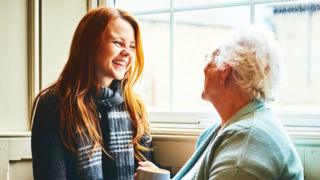
Image copyright
Getty Images
As lockdown restrictions have eased, people across the UK can now set up support bubbles.
The aim is to help people who’ve been cut off from friends and family.
Those inside a support bubble count as one household and do not have to socially distance from one another.
What is a support bubble?
A bubble is defined as a group of people with whom you have close physical contact. The idea was first introduced in New Zealand.
Single adults living alone – or single parents whose children are under 18 – can now form a support bubble with one other household.
The second household can be of any size and can now include “at risk” people who were shielding.
The independent advisory group Sage has been asked to examine if, when and how people might safely be allowed to expand their bubbles.
What are the support bubble rules?
Support bubbles must be “exclusive”. Once in one, you can’t switch and start another with a different household.
People in each bubble can stay in each other’s homes and do not have to socially distance. They count as one household, which means that in England a further household is now allowed to stay overnight with them.
Anyone in the bubble contacted as part of England’s test and trace programme must stay at home. If they develop coronavirus symptoms, everyone in the bubble must self-isolate.
There is no limit on how far you can travel in England for your support bubble but local is best, the government says.
Bubbles can be cross-border with Scotland and Wales.
But what if…?
Social and family groups are complicated and might not fit bubble rules.
Grandparents:
- If you are single, you could bubble with one of your children’s households, but you must stick with them
- Households of two grandparents cannot bubble if their children live with other adults
Single parents:
- You could bubble with a friend, another single parent or a household with two adults
- You could use a bubble to arrange unpaid childcare
- If any children at home are over 18, you can’t form a bubble
- If you already share childcare with your ex during lockdown, you can form a support bubble with another household
If you are single:
- Two single people each living alone could bubble
- Someone in a houseshare could bubble – but those they share with wouldn’t be allowed to form their own bubbles
You can read the government’s guidelines for England in full here.
Image copyright
Getty Images
What if I don’t live alone?
If you don’t live on your own, or you are not a single parent whose children are under 18, then you can’t join another household.
However, you can, of course, invite someone eligible to join a social bubble with your household.
In England, two households or support bubbles can now meet indoors and stay overnight – with social distancing.
What about schools?
Social distancing is being adhered to as much as possible, keeping close contact between pupils to a minimum.
Year groups and/or classes will be kept apart in bubbles. Maintaining distinct groups or bubbles that do not mix makes it quicker and easier in the event of a positive case to identify those who may need to self-isolate and keep that number as small as possible.
Who else can I meet?
Small groups of people can meet without forming a bubble, but should socially distance. The number of people you are allowed to meet depends on where in the UK you live.
In England, a maximum of six people from up to six households can meet in any location ‒ public or private, indoors or outdoors. This does not need to be the same household each time.
Why are bubbles needed?
Basically, when people mix – especially in crowded places – coronavirus can spread.
The virus is transmitted by droplets from infected people when they talk, cough and sneeze.
These can enter the body through the eyes, nose and mouth, either directly or after touching a contaminated object.
That’s why people have been asked to maintain social distancing when meeting anyone not from their household.
Bubbles allow some people more contact with others, while keeping other social distancing measures in place.

















